DAVAO CITY (MindaNews / 04 June) – The House of Representatives on Wednesday night passed House Bill 6875 or the proposed Anti-Terrorism Act of 2020, with 173 voting yes, 31 voting no and 29 abstaining, even as Mindanawon representatives warned that draconian measures will not eradicate terrorism but exacerbate it.
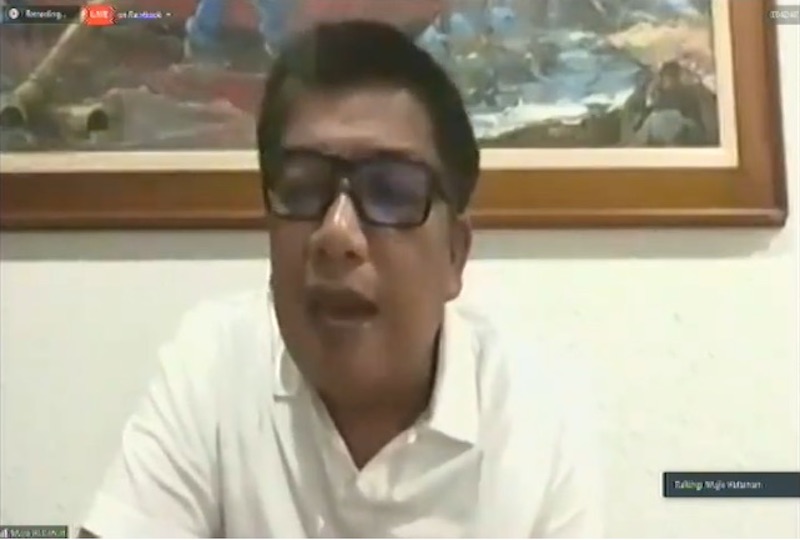 Basilan Rep. and Deputy Speaker Mujiv Hataman explains via Zoom his “No” vote to HB 6875 during the House of Representatives’ session on 03 June 2020. Screengrabbed from livestreamed session
Basilan Rep. and Deputy Speaker Mujiv Hataman explains via Zoom his “No” vote to HB 6875 during the House of Representatives’ session on 03 June 2020. Screengrabbed from livestreamed session
“Hindi pa ba tayo natututo? Pag-etsapuwera, pagpapabaya, pang-aapi, pang-aabuso, paniniil ng karapatan at kalayaan—ito ang tunay na nagtutulak sa ilan tungo sa violent extremism” (Have we not learned our lessons? Exclusion, neglect, oppression, abuse of power, suppression of rights and freedom – these are what really drive people towards violent extremism), Basilan Rep. and Deputy Speaker Mujiv Hataman said in explaining his “No” vote via Zoom.
Bayan Muna partylist Rep. Carlos Isagani Zarate, a Mindanawon from General Santos and Davao Cities, said the Duterte administration’s regard for human rights is worse than the Marcos dictatorship’s martial law. In Filipino, he said that under Marcos, there was pretense and denial of violation of human rights but the Duterte administration “proudly and unashamedly passed a law that will allow officials of government to violate human rights.”
Out of 31 who voted “No” to the bill, at least eight are Mindanawons: Hataman and Zarate, Agusan del Norte 1st district Rep. Lawrence Fortun, Anak Mindanao partylist Rep. Amihilda Sangcopan, Bayan Muna partylist Rep. Eufemia Cullamat who is a Manobo from Surigao del Sur and Lanao del Norte 2nd district Rep. Yasser Alonto Balindong, all of whom explained their “No” vote during the livestreamed session.
Cagayan de Oro City Rep. Rufus Rodriguez Zarate also voted “No.” Zarate told MindaNews. Maguindanao Rep. Esmael “Toto” Mangudadatu also voted “No.”
Lanao del Norte 1st district Rep. Mohamad Khalid Dimaporo and Bukidnon 2nd district Rep. Jonathan Keith Flores abstained from voting, citing different reasons.
Only one paragraph
Hataman wondered why the bill devoted several provisions on widening the scope of who could be considered terrorists but only one paragraph on how to counter violent extremism. “Hindi ba dapat nandoon ang tutok natin?” (Shouldn’t we focus on that?)
He cited several ways of fighting terrorism other than by force or arrests. In Filipnio he said, it could be “through development. Through dialogue. By caring for communities. Education to encourage critical thinking and not fall into the hands of recruiters.”
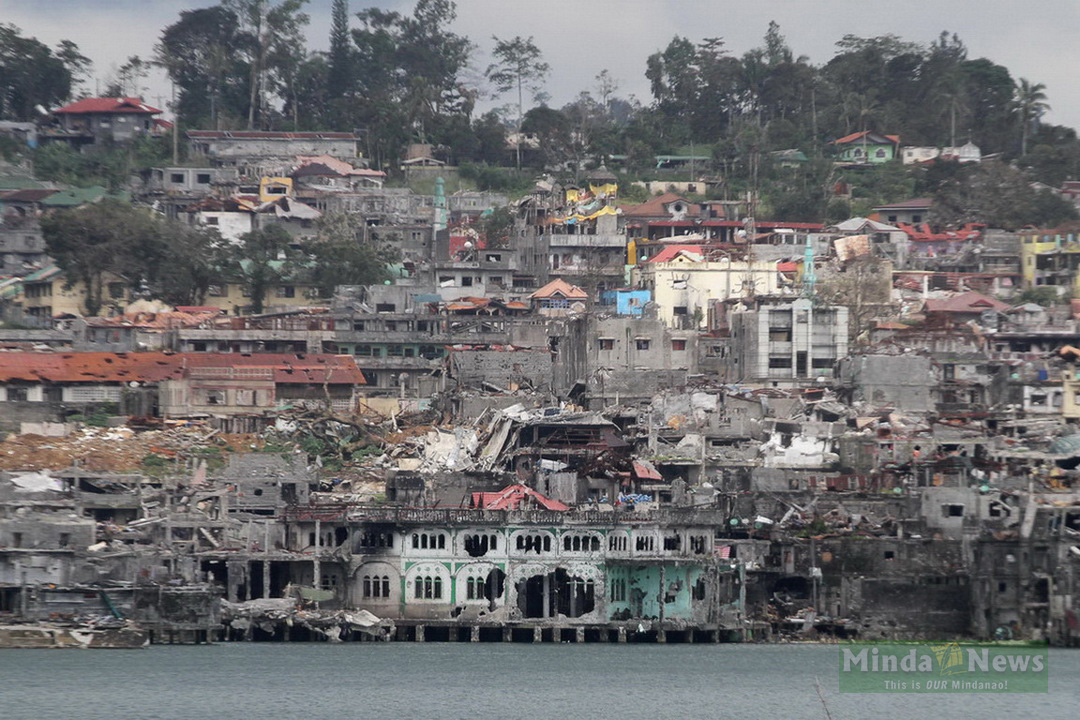 Buildings lay in ruins after the five-month battle to retake Marawi City from ISIS-inspired terrorists. Photo taken 24 October 2017. MindaNews photo by MANMAN DEJETO
Buildings lay in ruins after the five-month battle to retake Marawi City from ISIS-inspired terrorists. Photo taken 24 October 2017. MindaNews photo by MANMAN DEJETO
“These reform measures, are among the pillars of counter-terrorism,” said Hataman, who served as governor of the Autonomous Region in Muslim Mindanao from December 2012 to February 2019 and before that Anak Mindanao party-list Representative for nine years.
Hataman explained that in his long history of fighting terrorism in his island province where the Abu Sayyaf once thrived, he learned that the most effective way, much more than war and punishment, is genuine dialogue, interaction, openness and compassion.
None of these measures is present in HB6875, he said, adding it is “not meant to combat terrorism. It is meant to give the state the power to tag whomever they please as a terrorist.”
Certified urgent
Zarate said the rush to pass the bill in the midst of the COVID-19 pandemic merely shows the obsession of the Duterte administration to centralize power and impose more draconian measures even if these are against the Constitution.
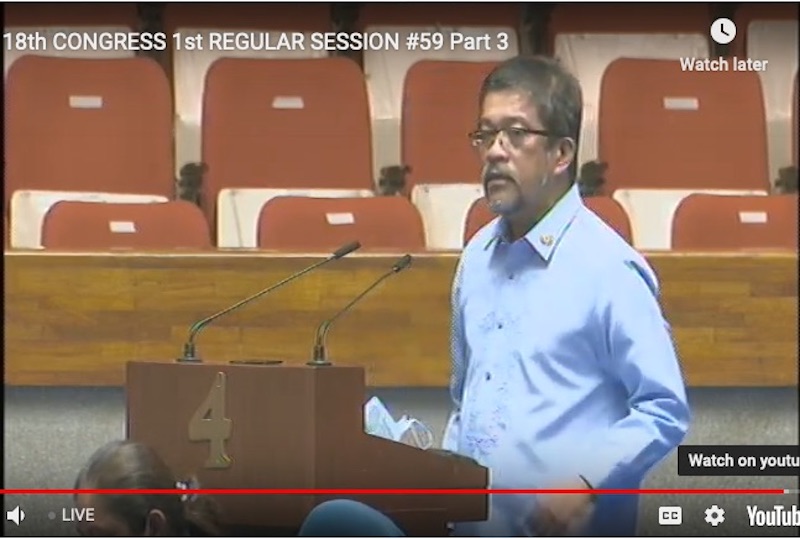 Bayan Muna partylist Rep. Carlos Isagani T. Zarate explains his “No” vote to HB 6875 during the House of Representatives’ session on 03 June 2020. Screengrabbed from livestreamed session
Bayan Muna partylist Rep. Carlos Isagani T. Zarate explains his “No” vote to HB 6875 during the House of Representatives’ session on 03 June 2020. Screengrabbed from livestreamed session
He asked why urgent bills to help the public cope with the COVID-19 pandemic were not certified urgent but the anti-terror bill was by President Duterte and the House of Representatives passed it without thoroughly discussing and debating it at the level of the committee and the plenary. “Lumalabas na nagmistulang isang rubber stamp ang Kongresong ito na Ehekutibo” (It appears this Congress is a rubber stamp of the Executive).
Duterte certified the bill as urgent even as the military and police have repeatedly claimed they are winning the war against terrorism, in particular against the IS-linked Abu Sayyaf and the Maute Group which has not been able to regroup since the Marawi Siege of 2017. The military and police have also repeatedly claimed victory in the fight against the New People’s Army (NPA) and the Communist Party of the Philippines (CPP) which Duterte branded as “terrorist organizations” in his Proclamation 374 issued on December 5, 2017.
Why the urgency?
Dimaporo explained he abstained from voting because “we were not allowed to ask questions.”
He said he wanted to know “what is our status now? “
“We just went through how many years of martial law and I have reports from the Regional Peace and Order Council and Provincial Peace and Order Councils that in the Lanao region, we have eradicated the terrorists. So what is the status now? why is it so urgent that we have an Anti-Terrorism law. Akala ko tapos na tayo dito?” Dimaporo asked.
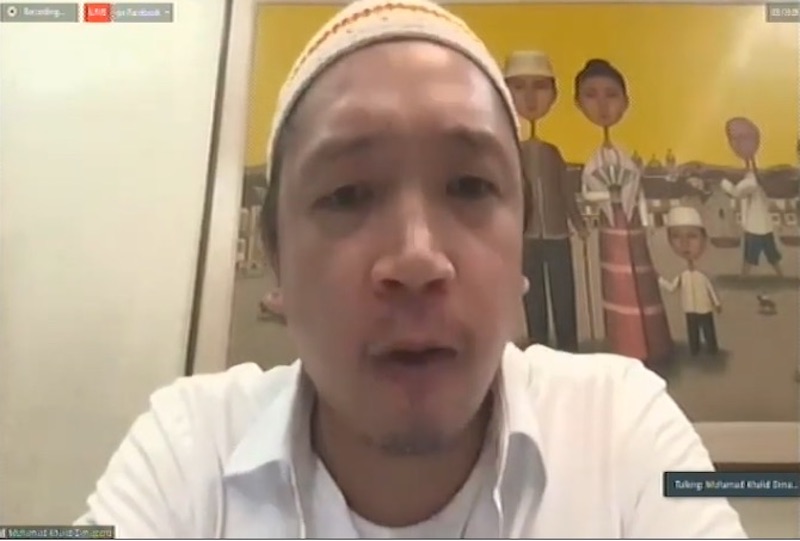 Lanao del Norte 2nd district Rep. Mohamad Khalid Q. Diamporo explains via Zoom why he abstained from voting on HB 6875 during the House of Representatives’ session on 03 June 2020. Screengrabbed from livestreamed session
Lanao del Norte 2nd district Rep. Mohamad Khalid Q. Diamporo explains via Zoom why he abstained from voting on HB 6875 during the House of Representatives’ session on 03 June 2020. Screengrabbed from livestreamed session
Duterte placed Mindanao’s 27 provinces and 33 cities under martial law from May 23, 2017, Day 1 of the Marawi Siege, until December 31, 2019.
Dimaporo recalled that he asked Defense Secretary Delfin Lorenzana during a session on the extension of martial law what they were doing to get the 80 terrorists at large in Luzon and the Visayas and was told cases had been filed against them and warrants of arrest had been issued.
“If we were able to do it that way, why do we need HB 6875 when we have the capability and manpower and the ability to file cases against terrorists that are at large?” he asked.
He said he also wanted to know the “practicability” of the anti-terror bill when in the pursuit of the top two terrorists in Mindanao – Isnilon Hapilon and Marwan – “never did it end in detention of these terrorists.” They were killed during military and police operations, he said.
“There is no practicability of serving an arrest warrant or trying to capture high profile terrorists, real terrorists” he said, adding what Mindanao needs “are more police and military so we can properly secure the region,” Dimaporo said.
Unconstitutional
For Fortun, the bill “does not only countenance, but actually seeks to legitimize, acts that are clearly violative of our Constitution.”
He cited ambiguity of several provisions and the removal of constitutional parameters on law enforcement which exposes the measure to abuse. “The civil and political rights and the fundamental freedoms of our people are gravely threatened,” he stressed.
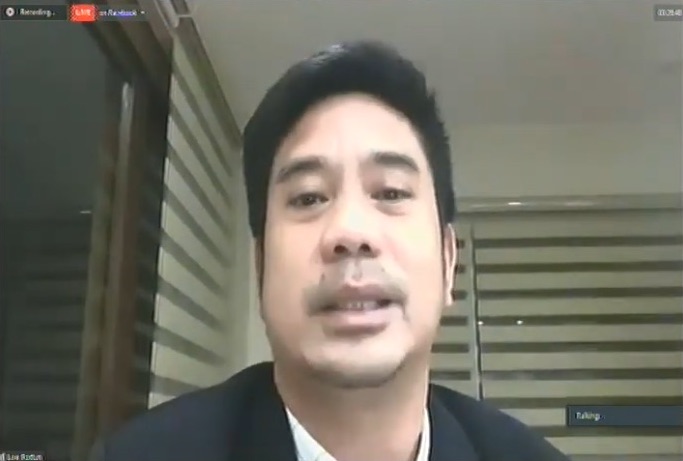 Agusan del Norte 2nd district Rep. Lawrence H. Fortun explains via Zoom his “No” vote to HB 6875 during the House of Representatives’ session on 03 June 2020. Screengrabbed from livestreamed session
Agusan del Norte 2nd district Rep. Lawrence H. Fortun explains via Zoom his “No” vote to HB 6875 during the House of Representatives’ session on 03 June 2020. Screengrabbed from livestreamed session
He cited Section 29 which allows for detention of 14 days, subject to extension by another 10 days, without judicial charge, should the Anti-Terrorism Council deem it necessary.
“Even during times when the privilege of the writ of habeas corpus is suspended, the Constitution only allows detention of a maximum of 72 hours,” Fortun said.
More suppression is no solution
Cullamat said the bill will allegedly counter terrorism and terrorists but examined closely, she said in Filipino, “this bill has a different intent. This is not for terrorists but for the critics, activists and ordinary citizens who are protesting corruption and the way officials are running the government.”
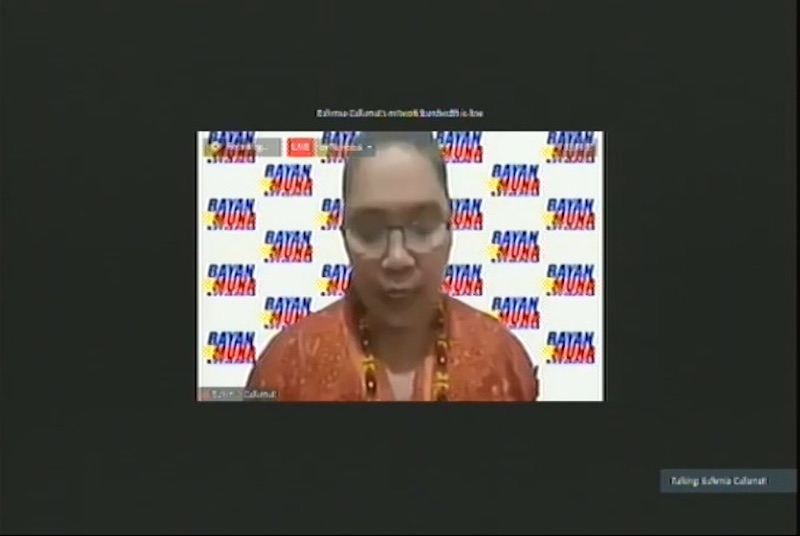 Bayan Muna partylist Rep. Eufemia Cullamat of Surigao del Sur explains via Zoom her”No” vote to HB 6875 during the House of Representatives’ session on 03 June 2020. Screengrabbed from livestreamed session
Bayan Muna partylist Rep. Eufemia Cullamat of Surigao del Sur explains via Zoom her”No” vote to HB 6875 during the House of Representatives’ session on 03 June 2020. Screengrabbed from livestreamed session
“Hindi higit pang panunupil ang solusyon sa mapanupil nang sistema na nagdulot ng kawalan ng hustisya, lupa, disenteng trabaho. Tutol ako sa terror bill sapagkat mahal ko ang aking bansa at ang aking mga mamamayan” (The solution to the oppressive system that breeds injustice, landlessness and unemployment is not more suppression. I am against this terror bill because I love my country and my people).
Dilemma
Balindong said that as a Meranaw from Marawi, he is faced with a dilemma: “we, together with the other Muslim Filipinos, are also the most vulnerable when it comes to abuse of authority. We want to stamp out terrorism but we also want to prevent abuse of authority.”
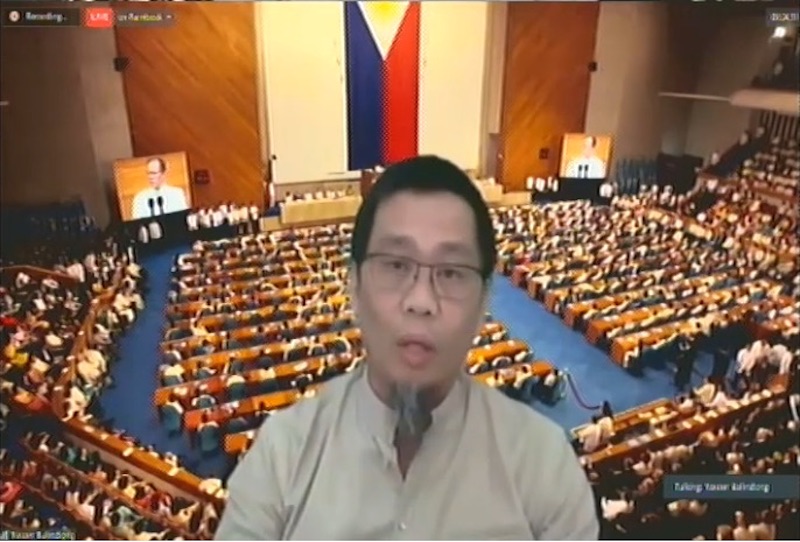 Lanao del Sur 2nd district Rep. Yasser Alonto Balindong delivers his privilege speech on the third anniversary of the Marawi Siege during the House of Representatives’ session on 03 Juen 2020. He submitted his explanation of his “No” vote to HB 6875. Screengrabbed from livestreamed session
Lanao del Sur 2nd district Rep. Yasser Alonto Balindong delivers his privilege speech on the third anniversary of the Marawi Siege during the House of Representatives’ session on 03 Juen 2020. He submitted his explanation of his “No” vote to HB 6875. Screengrabbed from livestreamed session
He said he could not vote for a law that would be used “to perpetrate evil against our people” so he will wait for a “better proposal that can both prevent terrorism and protect our people from abuses.”
Hataman said the bill has apparently forgotten that usually, it is the ordinary people who feel the real terror because usually, the terror comes from those in power.
He said the bill gives importance to widening the scope of who can be considered terrorist rather than how to find and go after the real terrorists.
No consultation
Hataman also lamented that no expert from among the Moro – they who are “pinakaapektado sa mga implikasyon ng batas na ito” (the most affected by the implications of this proposed law) — was invited to the committee hearings, whether in the House or in the Senate, none from the Bangsamoro Autonomous Region in Muslim Mindanao, none from civil society organizations. “Kung hindi man lang tinanong ang mga ekspertong Muslim, paano isasalamin ng panukalang ito ang realidad sa mga komunidad?” (If the Muslim experts were not asked, how will this proposed law reflect the realities in the communities?)
Zarate said the bill should be junked because it is “terorismo sa karapatang pantao at terrrismo sa ating demokrasya. Terorismo sa ating saligang batas ang New Anti-Terror Bill na ito” (terrorism to human rights, terrorism to our democracy. This New Anti-Terror Bill is terrorism to our Constitution), he said.
Rodriguez said the bill “endangers our civil and human rights. The State should guard against violent terrorist attacks, but should equally uphold the right of freedom of speech, right to peaceably assemble and the Constitution.”
Flores explained through a press statement on Thursday that he
abstained from voting. But he acknowledged that our judicial system is, “unfortunately, designed in such a way that it is disadvantageous for many who cannot afford proper legal representation” and the bill is “very prone to abuse.”
“Let us fight terrorism while upholding human rights and following due process,” he said.
Silence the critics and suppress lawful dissent
Sangcopan said that while the Moro and Lumad (Indienous Peoples) “remain unprotected from the prejudiced and the Islamophobic adherents with the non-passage of a law that will prohibit discrimination on account of ethnic and religious affiliation,” the anti-terrorism bill will “unjustifyingly broaden the influence of the already heavy-handed military and police forces through the extension of their surveillance power – including wire-tapping and recording our conversations, effecting warrantless arrests, and prolonging detention periods up to 14 days.”
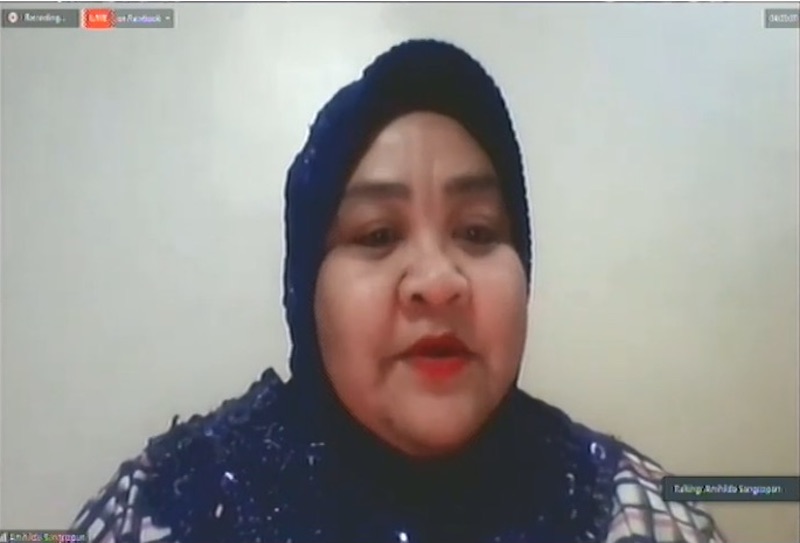 Anak Mindanao partylist Rep. Amihilda Sangcoapn explains via Zoom her “No” vote to HB 6875 during the House of Representatives’ session on 03 June 2020. Screengrabbed from livestreamed session
Anak Mindanao partylist Rep. Amihilda Sangcoapn explains via Zoom her “No” vote to HB 6875 during the House of Representatives’ session on 03 June 2020. Screengrabbed from livestreamed session
The bill even suspends the P500,000 per day penalty against wrongful arrest and imprisonment.
“Clearly, the passage of the anti-terror bill will not only be used as a tool for repression in the guise of thwarting terrorism; but it may also be employed to silence the critics and suppress lawful dissent,” Sangcoapn said.
Yes vote but…
Barbers, who voted yes to HB 6875, expressed optimism “we can still make amendments to this bill in the Bicam. I am not closing that possibility.”
But Barbers, one of the authors of the Human Security Act of 2007, said he found it “bothersome” that some of the safeguards in the present law were discarded in HB 6875
“For real terrorists, this is good … But for those hapless individuals who may be victimized for the flimsiest reason by abusive individuals, how will they be treated?” Barbers asked.
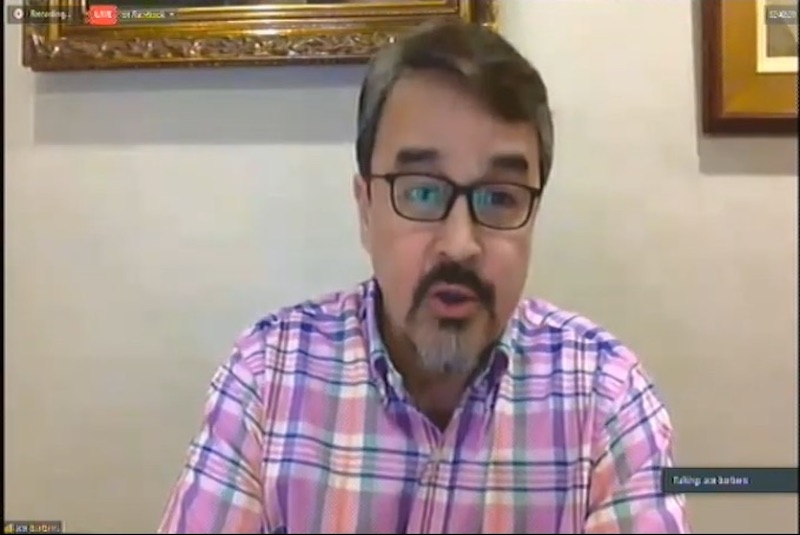 Surigao del Norte 2nd district Rep. Robert Ace S. Barbers explains his “Yes” vote to HB 6875 or the Anti-Terrorism bill, via Zoom during the House of Representatives’ session on 03 June 2020. Screengrabbed from livestreamed session
Surigao del Norte 2nd district Rep. Robert Ace S. Barbers explains his “Yes” vote to HB 6875 or the Anti-Terrorism bill, via Zoom during the House of Representatives’ session on 03 June 2020. Screengrabbed from livestreamed session
He cited history of how abusive law enforcers who are backed up by local and national politicians can arrest people on trumped up charges and destroy their lives and future and their families as well.
“This is the heart of the decades old rebellion that we are fighting until now, without an end in sight still,” he said, adding that while the objective is laudable, “in the hands of the wrong people, this bill is a potent weapon, which can be politically used.”
He said it is possible that during elections, people critical of the sitting administration “may be threatened with this crime, and all their conversations tapped as authorized under this bill.”
“If some people resort to this method, new rebels will be born, and the cycle will be repeated until these new fighters will know nothing else but to fight. Until rebellion becomes their way of life, like in other countries in the Middle East. Generations upon generations of fighters who know nothing else but war,” Barbers said
“We all want peace. We all want to run after terrorists and prevent them from sowing terror and destruction in our lives and property, but if we use this bill against innocent individuals, we ourselves commit terrorism because we wantonly violate their constitutional rights and worse, we too destroy their lives and their future,” he said. (Carolyn O. Arguillas / MindaNews)
READ
Rep. Yasser Alonto Balindong explains his “No” vote
Rep. Robert Ace S. Barber explains his “Yes” vote
Rep. Eufemia Cullamat explains her “No” vote
Rep. Jonathan Keith Flores explains why he abstained
Rep. Lawrence H. Fortun explains his “No” vote
Rep. Mujiv Hataman explains his “No” vote
Rep. Amihilda Sangcopan explains her “No” vote
Rep. Carlos Isagani T. Zarate explains his “No” Vote
